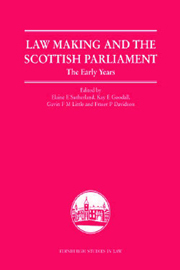Book contents
- Frontmatter
- Contents
- Preface
- List of Contributors
- Table of Cases
- Table of Westminster Statutes
- Table of Scottish Parliament Statutes
- Table of Westminster Statutory Instruments
- Table of Scottish Statutory Instruments
- THE SCOTTISH PARLIAMENT – ITS GENESIS AND OPERATION
- RIGHTS AND SOCIETY
- PUBLIC ADMINISTRATION AND SERVICES
- JUSTICE AND LEGAL SYSTEM
- ECONOMY AND ENVIRONMENT
- 14 Property Law: How the World Changed at Martinmas
- 15 Business
- 16 Environment and Sustainable Development
- 17 Transport
- Index
14 - Property Law: How the World Changed at Martinmas
from ECONOMY AND ENVIRONMENT
Published online by Cambridge University Press: 05 September 2013
- Frontmatter
- Contents
- Preface
- List of Contributors
- Table of Cases
- Table of Westminster Statutes
- Table of Scottish Parliament Statutes
- Table of Westminster Statutory Instruments
- Table of Scottish Statutory Instruments
- THE SCOTTISH PARLIAMENT – ITS GENESIS AND OPERATION
- RIGHTS AND SOCIETY
- PUBLIC ADMINISTRATION AND SERVICES
- JUSTICE AND LEGAL SYSTEM
- ECONOMY AND ENVIRONMENT
- 14 Property Law: How the World Changed at Martinmas
- 15 Business
- 16 Environment and Sustainable Development
- 17 Transport
- Index
Summary
INTRODUCTION – UK LEGISLATION
The first statute which was relevant to conveyancing was passed in 1540. A great deal of legislation was passed in the nineteenth century. The Conveyancing (Scotland) Act 1874 (hereafter “the 1874 Act”) remained the fundamental conveyancing statute until 1924. A small number of issues were dealt with in 1938 but, apart from that, there was very little legislative activity until 1970. Compulsory redemption and the prohibition of feuduties were introduced in 1974. Finally, in 1979, land registration was introduced. There were various other Acts between 1979 and 1995 which dealt with discrete areas of the law. In 1988 the Scottish Law Commission delivered a report on the law relating to the execution of deeds to the Lord Advocate. At this time Bills which related purely to Scotland and were non-contentious were generally introduced by private members whose right to introduce a Bill was decided by ballot. The Requirements of Writing (Scotland) Bill was to be so introduced but, unfortunately, the private member concerned failed to turn up and the Bill was lost. It says a great deal about the priority afforded by successive UK governments to purely Scottish Bills that the Act was not passed until 1995. In 1997 there was further legislation to deal with the vexed question of supersession of missives.
THE FEUDAL SYSTEM
Although there is evidence of a feudal charter being granted by Duncan II in 1094, it is generally accepted that the feudal system became established in Scotland during the reign of David I, which began in 1124. It began as a means of government and later evolved into a rudimentary system of private town planning. The Scottish Law Commission began looking at land tenure and property law in general as part of its Fourth Programme of Law Reform. The first discussion paper to be published related to the law of the tenement.
- Type
- Chapter
- Information
- Law Making and the Scottish ParliamentThe Early Years, pp. 271 - 302Publisher: Edinburgh University PressPrint publication year: 2011



